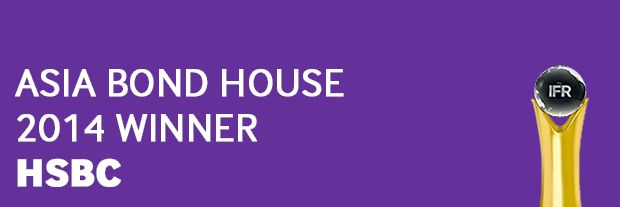Another record year for Asian bond issues saw one bank make jumbo deals and new structures look easy. For a track record of successful deals across the region, and for leading the way in bank capital, HSBC is IFR’s Asia Bond House of the Year.
HSBC clocked up more records in the Asian bond markets in 2014, helping launch 155 G3 bonds totalling over US$100bn as issuance from the region soared to new heights. Beyond just flexing its muscles, the bank also used its brainpower in bringing complex deals to market and leading the way in bank capital, the signature motif of the year.
Despite working on 38% more deals than any other arranger, HSBC managed to maintain its discipline and avoid pulling offerings, even in tough conditions, as it showed itself to be equally comfortable working for blue chips, debut issuers and high-yield borrowers.
“There were many important new developments in the Asian G3 market this year,” said Alexi Chan, the bank’s head of debt capital markets, Asia-Pacific. “These spanned regulatory capital, liability management, sustainable finance, high-yield and beyond. Issuers consistently turned to HSBC for innovative capital financing solutions.”
HSBC has established itself as the volume leader in Asian bonds in recent years, but it has also improved its high-yield capabilities and added to its structuring expertise. Investments in hybrid capital particularly paid dividends in 2014, as final Basel III regulations prompted a flurry of subordinated bank capital bonds, including October’s record issue from Bank of China.
HSBC was a global co-ordinator for the first US dollar Additional Tier 1 offering from Asia under Basel III, the US$300m non-call five perpetual bond from China Citic Bank International in April, and helped Krung Thai Bank raise US$700m in the first US-dollar Basel III-compliant Tier 2 offering from Thailand just weeks after a military coup.
BOC selected HSBC as a bookrunner on its Rmb40bn (US$6.5bn) preference share offering, the debut AT1 issue from mainland China and the largest single-tranche deal in history in the Asian bond market. Weeks later, HSBC was a joint global co-ordinator on BOC’s US$3bn Tier 2 issue, another first in the offshore market and a coveted repeat mandate from a bank that competes with HSBC in Hong Kong and China.
HSBC missed few jumbo deals during the period under review, and held a key role on more than most of its rivals. It managed both the US dollar and euro tranches of Hutchison Whampoa’s US$5.4bn three-tranche offering in October, helping Hutch secure its lowest coupon on record with the euro tranche and leaving negligible new issue concessions.
High-yield was also a highlight for the bank. It helped bring Tata Steel to market with Asia’s largest debut corporate high-yield bond and enabled Samvardhana Motherson Automotive Systems to print the first debut high-yield bond in euros from an Indian company.
It reopened the high-yield market for China property issuers, a sector that was cold-shouldered by investors at times in 2014, bringing Country Garden Holdings to the market with a private placement and public deal over two days in May.
HSBC also added to its credentials in Islamic finance with Hong Kong’s first sukuk. The US$1bn deal printed at only 23bp over US Treasuries, the tightest spread ever achieved on a benchmark US dollar bond from an Asian government issuer outside Japan, which put paid to the received wisdom that issuers of Islamic structures always needed to pay a premium.
The bank also helped issuers reach new groups of investors. HSBC was sole global co-ordinator for the first Green bond from Asia’s corporate sector, managing chipmaker Advanced Semiconductor Engineering’s US$300m three-year issue. HSBC was also joint lead manager when Maybank issued notes in the Tokyo Pro-Bond market, the first Malaysian issuer to do so.
As it showed again in 2014, HSBC is also the clear leader in the offshore renminbi market. As well as headline-grabbing deals such as the UK government’s debut offshore renminbi bond, it also broke new ground with Lion City renminbi bonds by Swiber Holdings, the first Singaporean corporate issuer to print a Singapore-cleared CNH deal, and helped Malaysia’s Cagamas make its renminbi debut with a Tiger Emas bond cleared in Malaysia.
HSBC maintained its lead in almost every local currency in Asia, again acting as the bank of choice for financial issuers looking to raise Basel III-compliant capital, and brought foreign issuers including ICICI Bank and UOB to the Australian dollar market, rounding off an impressive year across the region.
To see the digital version of the IFR Review of the Year, please click here.
To purchase printed copies or a PDF of this report, please email gloria.balbastro@thomsonreuters.com.



